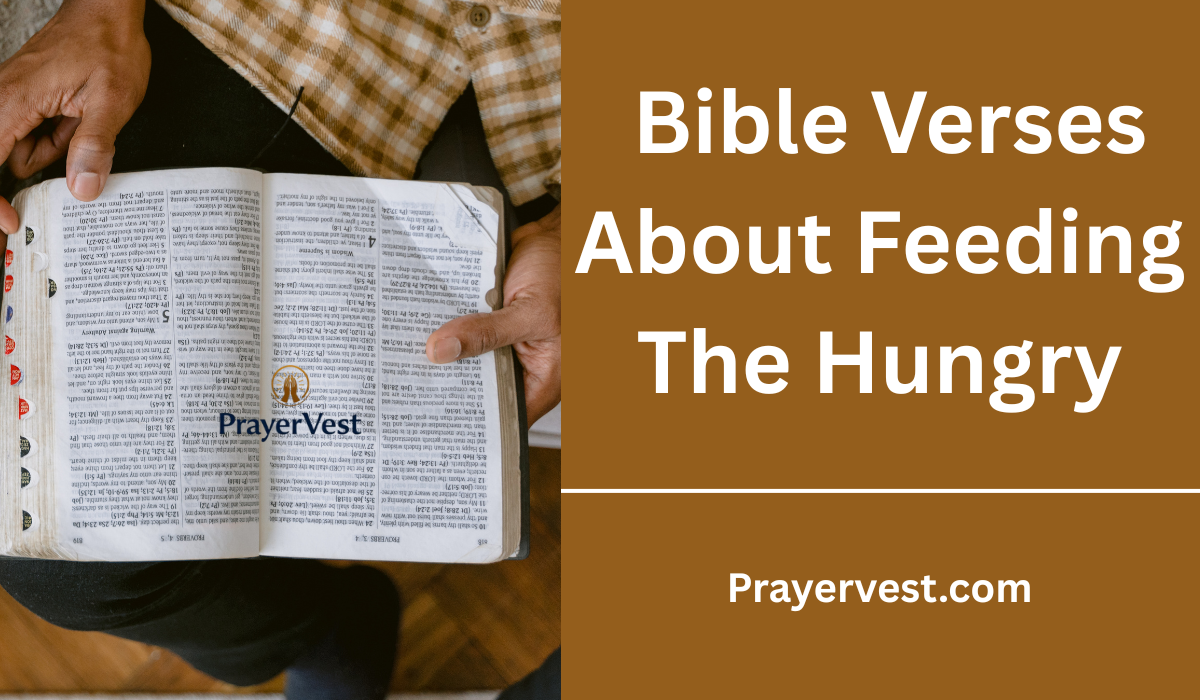A major subject in the Bible is feeding the hungry, which reflects God’s compassion, justice, and love. Scripture repeatedly highlights the significance of helping those in need, from the Old Testament rules that required Israel to leave gleanings in the fields for the destitute to Jesus’ explicit instruction to care for “the least of these.”
In the biblical context, food is more than just physical sustenance; it is a symbol of compassion, respect, and the tangible manifestation of love. Giving is a necessary manifestation of faith and obedience to God, as the Scriptures about feeding the hungry remind us.
The Bible makes clear that providing for the hungry is closely related to blessing and righteousness. God says in Isaiah that His light would shine like the dawn on those who give their bread to the hungry. According to Proverbs, helping the underprivileged is equivalent to helping the Lord.
Jesus not only multiplies loaves and fish to feed a crowd in the Gospels, but He also claims that by feeding the hungry, we are feeding Him. These verses emphasize that showing compassion is a spiritual practice that brings us nearer to God’s heart and goes beyond simple nice deeds.


Considering Bible passages on feeding the hungry pushes us to demonstrate our faith in practical ways. It challenges believers to show God’s love via deeds rather than just words and intentions. Scripture encourages us to view feeding the hungry as an act of obedience and worship, whether it be through food sharing, donations to charities that aid the underprivileged, or everyday acts of kindness. These verses encourage us to live out Christ’s love in real ways so that no one in our community is denied the spiritual and bodily sustenance that God desires for His children.
40 Inspiring Bible Verses About Feeding The Hungry (2026)
1. Leviticus 19:9-10
“When you reap the harvest of your land, do not reap to the very edges of your field or gather the gleanings of your harvest. Do not go over your vineyard a second time or pick up the grapes that have fallen. Leave them for the poor and the foreigner. I am the Lord your God.”
God’s law to Israel established a system of care for the poor by requiring farmers to leave part of their harvest for those in need. This principle teaches generosity, compassion, and social responsibility. It shows that feeding the hungry is not optional but part of living faithfully before God.
2. Deuteronomy 15:11
“There will always be poor people in the land. Therefore I command you to be openhanded toward your fellow Israelites who are poor and needy in your land.”
This verse acknowledges the ongoing presence of poverty but calls God’s people to respond with generosity and compassion. Rather than ignoring or dismissing the needs of the hungry, the command is clear: open your hands and hearts. Feeding the hungry becomes a way of showing God’s love in action.
3. Psalm 146:7
“He upholds the cause of the oppressed and gives food to the hungry. The Lord sets prisoners free.”
The psalmist highlights God’s character as one who provides for the needy and sustains the vulnerable. Feeding the hungry is part of God’s justice and compassion, reflecting His care for those who cannot provide for themselves. Believers are called to mirror this same heart of mercy in their daily lives.
4. Proverbs 22:9
“The generous will themselves be blessed, for they share their food with the poor.”
Generosity is not only an act of kindness but also a source of blessing. Sharing food with the hungry reflects a heart aligned with God’s purposes. This verse encourages believers to see generosity not as loss but as gain, both spiritually and in the blessings that come from obedience to God’s Word.
5. Isaiah 58:10
“If you spend yourselves in behalf of the hungry and satisfy the needs of the oppressed, then your light will rise in the darkness, and your night will become like the noonday.”
This verse connects generosity with spiritual renewal. Feeding the hungry is not just an act of charity but an act of obedience that brings light and transformation into our lives. God promises that when we care for the needy, we ourselves will be strengthened and filled with His light.
6. Isaiah 58:7
“Is it not to share your food with the hungry and to provide the poor wanderer with shelter—when you see the naked, to clothe them, and not to turn away from your own flesh and blood?”
God defines true worship and fasting not by ritual but by acts of compassion. Sharing food with the hungry is central to living out faith in a way that honors God. This verse reminds us that genuine spirituality is practical and relational, meeting real needs with love.
7. Ezekiel 18:7
“He does not oppress anyone but returns what he took in pledge for a loan. He does not commit robbery but gives his food to the hungry and provides clothing for the naked.”
Here God describes the righteous person as one who lives justly and shows compassion to the needy. Feeding the hungry is seen as an essential mark of righteousness, not an optional act of kindness. It shows that justice and mercy are at the heart of God’s vision for His people.
8. Matthew 25:35
“For I was hungry and you gave me something to eat, I was thirsty and you gave me something to drink, I was a stranger and you invited me in.”
Jesus identifies Himself with the hungry, thirsty, and needy. Feeding the hungry becomes an act of serving Christ Himself. This powerful teaching shows that acts of compassion are not just social deeds but deeply spiritual, directly connected to our relationship with Jesus.
9. Luke 3:11
“Anyone who has two shirts should share with the one who has none, and anyone who has food should do the same.”
John the Baptist emphasizes repentance through practical love and generosity. Sharing food with the hungry is one of the clearest expressions of a changed heart. This verse challenges believers to live with open hands, willing to share their abundance with those in need.
10. Luke 14:13
“But when you give a banquet, invite the poor, the crippled, the lame, the blind.”
Jesus challenges cultural norms of hospitality by calling us to include those who cannot repay us. Feeding the hungry and welcoming the marginalized reflect God’s kingdom values. True generosity seeks no reward but gives freely as God Himself gives to us.
11. Proverbs 19:17
“Whoever is kind to the poor lends to the Lord, and he will reward them for what they have done.”
This verse highlights the spiritual principle behind feeding the hungry: acts of kindness are ultimately directed toward God Himself. When we provide for those in need, it is as if we are giving directly to the Lord. Generosity becomes a form of worship, reflecting a heart aligned with God’s compassion. The promise of reward is not just material—it is a blessing of favor, peace, and spiritual fulfillment that comes from living in obedience to God’s commands.
12. Proverbs 28:27
“Those who give to the poor will lack nothing, but those who close their eyes to them receive many curses.”
God’s Word draws a clear contrast between generosity and neglect. Feeding the hungry demonstrates faith in God’s provision and obedience to His moral law. Those who ignore the needs of the poor may seem comfortable in the short term, but the Bible warns that such indifference invites spiritual and relational consequences. Conversely, sharing our resources invites God’s protection, blessing, and lasting satisfaction.
13. Isaiah 25:4
“You have been a refuge for the poor, a refuge for the needy in their distress, a shelter from the storm and a shade from the heat.”
God Himself is described as a protector and provider for the hungry and oppressed, offering shelter and relief in times of trial. As His followers, we are called to reflect His heart by feeding the hungry and providing for those in need. This verse reminds us that acts of compassion echo God’s own care, bringing comfort, hope, and tangible relief to those suffering around us.
14. Jeremiah 22:16
“He defended the cause of the poor and needy, and so all went well. Is that not what it means to know me?”
God equates true knowledge of Him with justice and mercy toward the vulnerable. Feeding the hungry is not merely a charitable act but a demonstration of genuine faith and understanding of God’s character. Those who act in defense of the poor align themselves with God’s purposes, embodying His love in practical ways that transform communities and glorify His name.
15. Matthew 14:16
“Jesus replied, ‘They do not need to go away. You give them something to eat.’”
In the miracle of feeding the five thousand, Jesus instructs His disciples to provide for the hungry themselves rather than sending them away. This moment illustrates that God calls us to be His hands and feet in meeting practical needs. Even when resources seem limited, God can multiply our efforts when we respond with faith and compassion. Feeding the hungry becomes an opportunity to witness God’s power and grace in action.
16. Matthew 15:32
“Jesus called his disciples to him and said, ‘I have compassion for these people; they have already been with me three days and have nothing to eat. I do not want to send them away hungry, or they may collapse on the way.’”
Jesus’ compassion for the crowd demonstrates the priority of human need. Feeding the hungry is not just an act of duty but an expression of mercy, empathy, and love. This verse teaches that when we meet the needs of others, we mirror the heart of Christ, reflecting His concern for both physical and spiritual well-being. Our acts of service can prevent suffering and bring restoration to those in distress.
17. Luke 6:38
“Give, and it will be given to you. A good measure, pressed down, shaken together and running over, will be poured into your lap. For with the measure you use, it will be measured to you.”
Generosity creates a spiritual principle of reciprocity: the blessings we pour into others’ lives return to us in abundance. Feeding the hungry is not only an act of obedience but also a channel through which God pours His provision. The imagery of overflowing blessings emphasizes that giving is never wasted—our compassion toward others produces spiritual fruit, both in our lives and in the lives of those we serve.
18. Hebrews 13:16
“And do not forget to do good and to share with others, for with such sacrifices God is pleased.”
Sacrificial giving, including feeding the hungry, pleases God and reflects a heart devoted to His purposes. This verse encourages believers to integrate generosity into daily life, seeing acts of kindness as a form of worship. Feeding the hungry is not just an occasional deed but a lifestyle that honors God, demonstrates love for humanity, and cultivates a spirit of humility and service.
19. James 2:15-16
“Suppose a brother or a sister is without clothes and daily food. If one of you says to them, ‘Go in peace; keep warm and well fed,’ but does nothing about their physical needs, what good is it?”
James emphasizes that faith without action is incomplete. Feeding the hungry is a tangible demonstration of genuine faith, showing that love must be expressed through deeds. Words alone are insufficient; God calls believers to respond practically to suffering, bridging the gap between compassion and action. True Christian love involves meeting real needs in meaningful ways.
20. 1 John 3:17
“If anyone has material possessions and sees a brother or sister in need but has no pity on them, how can the love of God be in that person?”
This verse challenges believers to evaluate the authenticity of their love for God through their generosity. Feeding the hungry is a reflection of God’s love within us; ignoring the needs of others indicates a disconnect from the heart of Christ. Genuine faith manifests in caring for those around us, demonstrating God’s mercy and compassion in practical, life-changing ways.
21. Psalm 146:9
“The Lord watches over the foreigner and sustains the fatherless and the widow, but he frustrates the ways of the wicked.”
God’s care extends especially to the vulnerable—the hungry, the orphaned, and the marginalized. Feeding the hungry aligns believers with God’s protective heart, showing compassion for those often overlooked by society. By serving the needy, we participate in God’s justice, bringing hope and sustenance while reflecting His mercy to the world.
22. Proverbs 31:20
“She opens her arms to the poor and extends her hands to the needy.”
The virtuous woman exemplifies generosity and care for the less fortunate. Feeding the hungry is not simply a duty; it is an expression of love and stewardship. This verse teaches that a life of righteousness involves active concern for others, demonstrating God’s character through tangible acts of compassion.
23. Isaiah 32:8
“But the noble make noble plans, and by noble deeds they stand.”
Nobility of character is shown through deeds of kindness and justice. Providing food for the hungry is an act that elevates both the giver and the recipient, reflecting integrity and godly foresight. This verse reminds us that true honor is not in wealth or status but in living out compassion and generosity in meaningful ways.
24. Matthew 5:42
“Give to the one who asks you, and do not turn away from the one who wants to borrow from you.”
Jesus encourages a spirit of radical generosity. Feeding the hungry goes beyond social obligation; it is a reflection of God’s open-handed love. This verse challenges believers to meet needs willingly and without hesitation, trusting God to multiply our efforts and provide for both giver and recipient.
25. Luke 12:33
“Sell your possessions and give to the poor. Provide purses for yourselves that will not wear out, a treasure in heaven that will never fail, where no thief comes near and no moth destroys.”
Jesus emphasizes eternal reward over earthly accumulation. Feeding the hungry becomes a way to store up treasures in heaven. This verse teaches that generosity transforms material resources into lasting spiritual impact, aligning our priorities with God’s kingdom values.
26. Luke 19:8
“But Zacchaeus stood up and said to the Lord, ‘Look, Lord! Here and now I give half of my possessions to the poor, and if I have cheated anybody out of anything, I will pay back four times the amount.’”
Zacchaeus’ response to Jesus’ call shows that true repentance manifests in action. Feeding the hungry and restoring what is owed reflects a heart transformed by God’s grace. This verse reminds us that generosity is both a measure of faith and a step toward redemption and reconciliation with God and others.
27. Acts 20:35
“In everything I did, I showed you that by this kind of hard work we must help the weak, remembering the words the Lord Jesus himself said: ‘It is more blessed to give than to receive.’”
Paul reinforces Jesus’ teaching that giving—especially to those in need—is a source of blessing. Feeding the hungry is a tangible expression of hard work and love, showing God’s care through our efforts. This verse encourages believers to see generosity as a path to spiritual fulfillment and communal well-being.
28. Romans 12:13
“Share with the Lord’s people who are in need. Practice hospitality.”
Believers are called to support one another, especially those who are struggling. Feeding the hungry is a vital aspect of Christian hospitality and fellowship. This verse reminds us that generosity builds strong, compassionate communities and fulfills God’s command to care for one another with open hearts.
29. Galatians 6:2
“Carry each other’s burdens, and in this way you will fulfill the law of Christ.”
Feeding the hungry is part of carrying others’ burdens. By meeting physical needs, we participate in Christ’s mission of love and mercy. This verse emphasizes that practical help, such as providing food, is an expression of spiritual obedience and a way to reflect God’s heart to the world.
30. 1 Timothy 6:18
“Command them to do good, to be rich in good deeds, and to be generous and willing to share.”
God’s people are instructed to be intentional in their generosity. Feeding the hungry is not haphazard but a deliberate act of good deeds. This verse encourages believers to cultivate a lifestyle of giving, seeing every act of generosity as an opportunity to glorify God and bless others.
31. Hebrews 6:10
“God is not unjust; he will not forget your work and the love you have shown him as you have helped his people and continue to help them.”
Our acts of feeding the hungry are remembered and valued by God Himself. Even small deeds of compassion contribute to His kingdom and are never wasted. This verse reassures believers that every effort to help the needy carries eternal significance and is recognized by God.
32. James 1:27
“Religion that God our Father accepts as pure and faultless is this: to look after orphans and widows in their distress and to keep oneself from being polluted by the world.”
True religion is practical, expressed through love and service to the vulnerable. Feeding the hungry is central to pure and faultless faith, demonstrating that spirituality is not only a matter of ritual but of action. This verse emphasizes that caring for others is inseparable from living a holy life before God.
33. James 2:21
“Was not our father Abraham considered righteous for what he did when he offered his son Isaac on the altar?”
Faith is validated through action. Feeding the hungry, like Abraham’s obedience, demonstrates a faith that is living, active, and pleasing to God. This verse underscores that generosity and care for the needy are integral to a faith that moves beyond belief into practice.
34. 1 John 3:18
“Dear children, let us not love with words or speech but with actions and in truth.”
Love is most authentic when expressed through deeds. Feeding the hungry exemplifies love in action, turning abstract compassion into tangible care. This verse reminds us that true Christian love requires practical involvement, addressing real needs with sincerity and commitment.
35. Matthew 6:1-4
“Be careful not to practice your righteousness in front of others to be seen by them. … But when you give to the needy, do not let your left hand know what your right hand is doing, so that your giving may be in secret.”
God values humility in our acts of generosity. Feeding the hungry should flow from love, not for recognition. This passage teaches that the spiritual reward of feeding the hungry comes from God, who sees our heart, not from human applause, encouraging sincerity and selflessness in all acts of service.
36. Luke 6:30
“Give to everyone who asks you, and if anyone takes what belongs to you, do not demand it back.”
Feeding the hungry requires a spirit of open-handed generosity and trust in God’s provision. This verse challenges believers to go beyond transactional giving and embrace selfless acts of kindness. True compassion mirrors God’s unconditional love, expecting nothing in return but seeking the welfare of others.
37. 2 Corinthians 9:7
“Each of you should give what you have decided in your heart to give, not reluctantly or under compulsion, for God loves a cheerful giver.”
God values the attitude behind giving. Feeding the hungry should be motivated by joy and willingness, not obligation. This verse teaches that cheerful generosity pleases God, strengthens our faith, and fosters a spirit of love that blesses both giver and receiver.
38. Psalm 41:1-2
“Blessed are those who have regard for the weak; the Lord delivers them in times of trouble. The Lord protects and preserves them—they are counted among the blessed in the land.”
Compassion for the hungry and weak brings divine blessing. Feeding the hungry aligns us with God’s protective and preserving power. This verse assures believers that God honors and delivers those who actively care for the vulnerable, highlighting the spiritual reward of generosity.
39. Proverbs 14:31
“Whoever oppresses the poor shows contempt for their Maker, but whoever is kind to the needy honors God.”
How we treat the hungry reflects our relationship with God. Feeding the hungry honors Him, while neglecting them shows disregard for His authority. This verse reminds believers that acts of kindness are inseparable from reverence for God, making compassion both a moral and spiritual imperative.
40. Revelation 3:18
“I counsel you to buy from me gold refined in the fire, so that you may be rich; and white clothes to cover your shameful nakedness, and salve to anoint your eyes, so that you may see.”
While this verse speaks metaphorically about spiritual wealth, it emphasizes true riches come from God and are reflected in acts of love and mercy. Feeding the hungry is one way believers store eternal treasures, investing in a kingdom that lasts beyond earthly possessions. True wealth is measured by compassion and obedience to God’s commands.
Conclusion
In addition to being a selfless deed, feeding the hungry is a clear illustration of God’s love at work in the world. Scripture makes clear that God has a great concern for the underprivileged and exhorts His people to be kind, giving, and just. Every verse serves as a reminder that sharing our resources is a necessary and mandatory aspect of practicing our faith. In addition to providing for their bodily necessities, feeding the hungry reflects Christ’s teaching that we should love others as ourselves.
In the end, feeding the hungry is a spiritual act that involves more than just providing food; it involves restoring dignity, giving hope, and demonstrating God’s goodness to the world. We align ourselves with the values of God’s kingdom when we respond to hunger with willing hearts and open hands. Given that every act of service is a manifestation of God’s grace, may these Bible passages encourage us to live frugally, act with compassion, and shine a light on those in need.






